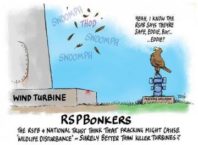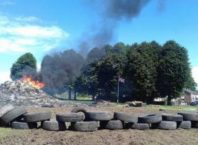THE BATTLE FOR CABLE STREET: 80 years on
CABLE STREET is one of those evocations that everybody of a certain mindset knows.
It conjures images of Black Shirt thugs, vicious & overbearing police – some on horseback & others bringing truncheons down on the local young men & women out defending each other from anyone in a dark uniform (whether with a crown or a facist flash on it).
In fact the wearing of political uniforms in the U.K. following that epic day in 1936 have been banned by law.
Recently the 21st century’s copy cats of Oswald Mosely’s British Union of Fascists, ‘Britain First’, were arrested and charged – not with hate crime or racism or aggravation – but with wearing political uniforms.
To most Brits, on the face of it, the idea of ‘home grown’ fascists seems quite abhorrent & very ‘un-British’. One of Orwell’s wartime essays on the identity of ‘Englishness’ explains it away by simply illustrating how the British are rather mediocre, indulging in butterflies, bird watching or stamp collecting, rather than obsessing over extreme ideologies and pantomime uniforms.
Orwell was writing as a propagandist however, whilst we were fighting for our lives against nazism and fascism. Now the generation who fought the last world war are dying off at a fast rate we are coming to terms with many uncomfortable truths that would have either ruined their morale, or that they probably knew anyway but were powerless to resist.
The repugnant idea that there were powerful British establishment figures willing to – if not follow but certainly ‘flirt with fascism is an uncomfortable truth.
Following costly ‘victory’ in the 1914-18 war the British working classes, bled white in the war, felt betrayed by the old ruling classes and looked mainly to socialism and communism to save themselves.
The establishment had much to fear and everything to lose. Rightly so.
A junior army officer, Oswald Mosley, first entered politics in the new Labour Party at this time. There was a mutual appeal to and from working class men he had fought with in the war. Yet Mosley – briefly a cabinet minister and knighted by the King – gradually shifted to the right. Inspired by the facist movements on mainland Europe Mosley gradually became one himself and founded the British Union of Fascists.
A good representation of the dichotomy of the British aristocratic establishment and ruling classes – who had lost a great deal following the Great War (officer casualties were actually proportionally much higher than other ranks) – was one group of Siblings. The Mitford sisters were friends and lovers with the worlds Facist & Communist big hitters. One married Mosley.
By the time of the 1930s many of the ailing British aristocracy felt they could no longer fend off the ‘red menace’ at home or abroad with ‘using’ people like Hitler.
Hitler’s anti-semitism was well known at the time. But before the age of the extermination camp, it was tolerated and even encouraged. Anti-semitism wasn’t a new concept in Europe. Indeed there was (& is today) the oxymoron of Zionist anti-Semites – it meant getting the Jews out of Europe after all.
Jewish Londoners in the 1930s largely lived in great poverty in and around Stepney in the East End of London. Crammed into shabbily built rooms and crumbling multi-occupancy building. Suffering from poor sanitation, bad diets, sketchy health care, high unemployment, life was hard. But Jewish people coped very well. They had a strong community ethic, strong faith, a hard work ethic, and fought through some of the worst privations of the infamous East End.
Yet they were ‘different’.
Against a backdrop of the ‘hungry 30s’ following the Wall Street Crash. Fascism was on the March in Europe and seduced thousands of unemployed young (& old) men in The UK, including London. Mosley was considered a powerful and mesmeric orator. Facist leaders were like that. Able to whip up a frenzy in a crowd, largely ignorant and starved of facts, with newspapers like the Daily Mail fuelling that hatred (& calling the Blackshirts ‘heroes’) Mosley set his sights on the Jewish community of the east end.
In 1936 militarism, extremism, Fascists & Nazis were on the march. The Japanese had invaded Korea, Manchuria and China. Mussolini had launched an Italian invasion of Ethiopia – using poison gas against defenceless people.
The two worlds of socialism and fascism however came to a head in Spain. The establishment powers rejected the popular electoral victory of the leftist republican government and civil war broke out. Volunteers and modern war kit from the main world powers were poured into Spain. The left adopted the war cry ‘No Pasaran!’ (‘They shall not pass’). Hitler’s bombers destroyed the Spanish city of Guernica. Leftists from all over the world mustered to fight Franco’s nazi backed Fascists.
Into this dangerous world of hate came Mosley & his Blackshirts marching into the east end of London.
On a sharp early October day the Blackshirts came. They planned to go through the main road – Aldgate High Street & Whitechapel Road. The locals however had come out in force to fight and defend their homes. Barricades had been erected – almost following the old Civil War ramparts which kept royalist troops out centuries before. The police however decided, rightly to stop the Blackshirts, but further south at Cable Street near Ratcliffe, to remove the barricades.
Cable Street – so called due to ships cables being made there – connects the old London docks with the city. It runs parallel with the river just before it curves at Limehouse Reach in the east. The street is a long straight road. In 1936 it was lined with badly built & overcrowded slum terraces (bombed away mostly in the Blitz). It was here that the police and Fascists confronted the locals.
The defence was organised and led by Jewish men who’d fought in the British army in the Great War. Many locals joined in the fray though – significantly a huge amount of Irish locals. The real fight began and ended with the police almost aiding the blackshirts by trying to remove the barricades. Blood was shed, many were injured, street weapons were wielded. A young man called Richard (later a fireman in the Blitz) remembered going out of his house, meeting his mates and getting stuck into the fight. “I didn’t see many black shirts but we certainly duffed up the coppers who were on Mosley’s side).
‘They shall not pass!’ Was the battle cry. They did not. Popular British Fascism was stopped and killed that day on Cable Street. It would never rise again. The ordinary poor working class people – inspired by socialism, their shared hatred of thuggery, and love for each other – had come together to literally fight (& beat) the power.
Three years later when the UK went to war against Hitler, Mosley was put in gaol yet his aristocratic chums in the Tories tried to make secret deals with the Nazis ‘to stop Stalin’. To no avail. The Parliamentary Labour Party supported the new maverick and bloodthirsty PM in 1940, Winston Churchill to carry on fighting.
We all know what the outcome was. Yet today the cycle of history has turned to release the ghosts of 1936. War rages, backed and perpetuated by the military superpowers. A great banking crisis has smashed the order of things. Masses of people no longer tryst the status quo and look to the bipolar world of UKIP or Jeremy Corbyn’s socialism. And racism has returned – manifested post-Brexit, but more actually levelled against another ‘immigrant & different’ set of people – muslims.
As Salma Yaquob stated in her speech at the Stop the War rally yesterday, “first the Irish were targeted and blamed and hated, then the Jews, then in Thatchers time in was the Black population, but today it is British muslims. We are the new scapegoats for everything that’s going wrong.” Yet she reminded everyone that there are good things about the UK: when we gather, when we share information, when we speak out, when we protest, question – and sometimes like at Cable Street 80 years ago today, we demonstrate an alternative, a flip side, a hope and a love that will win.
Let’s no lose it.
‘No Pasaran!’
Video Credit – Grace Petrie – They Shall Not Pass
#UnityMarchUK
If you like our content please consider helping us to take back the media
https://www.gofundme.com/UnityMarchUK




